 Laugh And Be Merry - King The Land
Laugh And Be Merry - King The Land
Disclaimer:
|
Squid Game and Hunger Games
Are they similar? Or is there a difference?
Those who have read the trilogy and/or watched The Hunger Games, like me, must have had this thought at least once while watching Squid Game. As a big fan of the novels, I couldn’t help but notice and draw parallels, only to find the lines of distinction between the two blur and disappear gradually. They had several more things in common than I had anticipated, that tied them together. Here’s first a small compilation of the more obvious differences between them:
SETTING: PRESENT vs FUTURE
Squid Game doesn’t have a specific setting in that, if real, it could have occurred at any point of time. The time, thus, is always the present. Squid Game appears more real since its characters each have a place in the everyday-world we ourselves live in. It’s close to the environment of the audience.
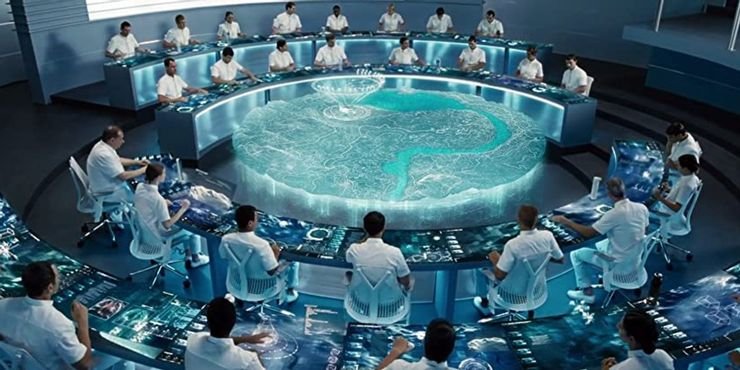
The Hunger Games, on the other hand, could be said to be far-fetched in a way. It is set in a dystopian future that has gone through an apocalypse. It’s easier to convince ourselves that the games are a figment of our imagination when the going gets tough, a comfort Squid Game doesn’t give us. The Hunger Games doesn't actually suffer from this lack of the extra realistic element, but its presence makes Squid Game all the more harrowing.
OBJECTIVE: MONEY vs SURVIVAL
Squid Game and The Hunger Games are both about survival in unfavourable conditions. But the feelings they evoke in the audience are quite different. Money drives Squid Game – it is the cause and the effect. Every participant selected desperately needs money. It is why they come back after voting against the games, and why they stay.
In The Hunger Games, the tributes do not have a choice in whether they want to participate or not – they are forced to kill or be killed. This helplessness creates sympathy with the viewers. The final reward adds to this – taking home money at the cost of a hundred other people looks greedy and selfish, but going home alive even if at the cost of the others looks like a hard-fought win.

It is as if the Squid-Gamers had a choice, and they consciously opted for the wrong one when in reality neither of the participants had any choice at all.
THEMES: CAPITALISM vs POWER

Squid Game and The Hunger Games are dark stories that touch several lesser explored elements in the world – from poverty to grey moralities to existential crises. The difference is, Squid Game is conducted to flaunt the power money holds, to the point that it mocks those who lack it. It uses money to seduce people by baiting them at their lowest with what they need – money that would help clear their debts. The Hunger Games, in contrast, are held as a symbol of a failed rebellion to suppress uprisings and show the people of Panem that the government holds the ultimate power.
In plain words: to put people in their places. Both shows can be downsized to two cruel and tyrannical instances of abuse of power, where their reach extends so far that they can monitor their winners even after the games. But since what fuels the power is different, Squid Game comes off as capitalistic, while The Hunger Games comes off as political.
DEATH: INDIRECT, AFTER vs DIRECT, BEFORE
An interesting common factor is the shows’ approach to death – it is methodical in a spine-chilling way, and so clinical as to be insensitive. This is one of the two biggest differentiating points. In Squid Game, one is dead if one fails to win the game, i.e. death comes after the game is complete. The Hunger Games is the exact opposite – one only wins the game if he is the last one standing, i.e. death comes before the game is complete.
The mode of death is also significant. Squid Game doesn’t make the players kill each other directly, except at the final level and on that one staged night. It makes them experience death and dying as a third party. The Hunger Games requires its players to kill in order to win at all stages of the game. As in throw a knife, twist a neck, string a bow, release an arrow or blow up food supplies.

Even though contestants have to deal with death in both cases, having to deliver the killing blow with their own hands is more gruesome and traumatic than just the knowledge that one survived at the cost of their gganbu’s life.
DEHUMANISATION: NUMBERS vs OBJECTS
The second major differentiating element is the approach to dehumanisation employed by the two stories. Squid Game assigns numbers to its participants, and shapes to its staff to remove any traces of tangible humanity. It makes the contestants insignificant by refusing to use their names, and forbidding speech with the staff. But things are nowhere more apparent than in the VIP lounge, which is nauseatingly decorated with painted human mannequins, and has a collection of various animal head gears on display. That room alone tells us all.

The Hunger Games dehumanises its players by reducing them to objects of attraction, fun and entertainment. The tributes are dressed up and paraded for everyone to see. Even those from the most backward of districts are given a team for beautification. They are the assorted, exclusive collections for that year. Mentally, it is impressed upon them to deliver gift-worthy performances to attract the sponsors to survive the arena. The staff here are decorated just like the mannequins, but they have jobs to do – Caesar Flickerman, the host, Effie Trinket, the chaperone and Seneca Crane, the game-maker.

Yet, perhaps the most inhuman aspect of both stories is how they don’t afford any dignity in death. The organ trafficking ring in Squid Game mirrors this fact. It’s why Katniss makes a wreath for Rue before she is airlifted away. To bestow respect one last time.
Whether we look at them from the surface or from up close, Squid Game and The Hunger Games are intrinsically similar. They only take different routes in how they execute the plot. Whether it be a certain dialogue by a player or the message they ultimately convey, there are things that both stories equally emphasise. It’s not really possible to draw a line of demarcation, but there are five points in which they show greater similarity.
AUDIENCE: CITIZENS OF CAPITOL AND THE VIPs
Much like the game-makers, the audience are also those who have lots of money to spend and nothing fun to spend it on. They have time at their disposal as well, but nothing worthy to spend it doing. The VIPs in Squid Game not only fund it but also wager bets. And if the player they bet on doesn’t make it? They just choose another one. The sponsors in The Hunger Games are no different. To them, the games are an annual sport the government organises for their enjoyment.
So they turn up dressed high and well for the events, including the before and after parties, reminding not-so-vaguely of those at the gambling house in the beginning of Squid Game, egging their horses on and on.
VICTOR LIFE: FRONTMAN AND THE MENTOR
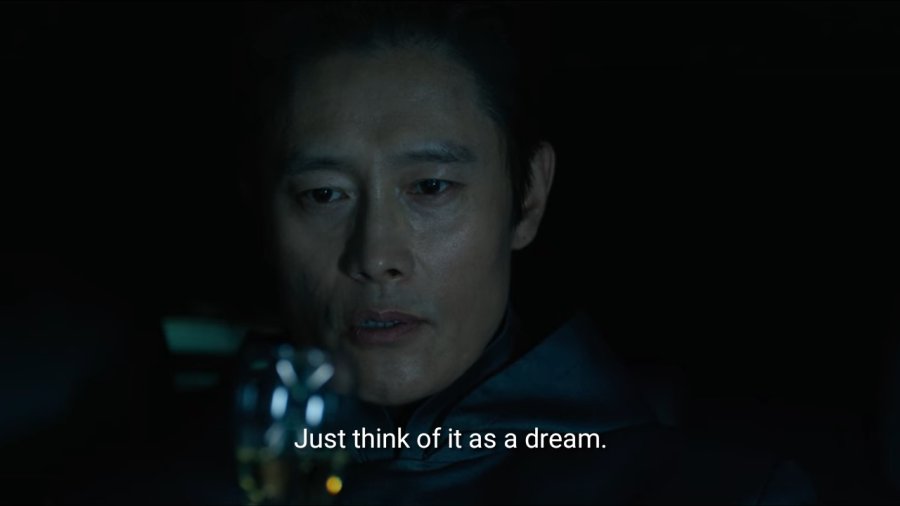
On the surface, the life of winners in both games may seem totally opposite. The Frontman (Lee Byung Hun) operates the Squid Game, promoting killing, while the victors of The Hunger Games are turned into mentors for future tributes where they focus on surviving. But both have been victimised and traumatised. Their hearts have turned cold and stony. They’ve graduated from being the horse to being the jockey. There is no more a sense of normalcy and family. Gi Hoon (Lee Jung Jae), like Haymitch, is lost, empty and blank towards the end.

“Just think of it as a dream,” someone says, tumbler in hand. “It wasn’t a bad dream for you anyway,” he adds. It’s a timeless dialogue, applying to all victors of all kinds of games.
REFUSAL TO YIELD: SEONG GI HOON AND PEETA MELLARK
It takes Gi Hoon until he sees someone else at the subway falling for the salesman's (Gong Yoo) tricks to realise that the games have not ended with the death of Oh Il Nam (Oh Young Soo). Someone else has simply filled that spot. That is when he’s had enough and stubbornly declares: “I'm not your horse.” In The Hunger Games, Peeta says something similar quite early: “I don’t want to be just another piece of their games.”
Katniss realises the truth of that statement much later. After all, as we’ve already established, the players are nothing more than racehorses who’ve fed and trained well to run the race that will make or break them. It’s why these two are probably the most powerful sentences in their respective stories, as they show the sheer obstinacy of the human will to hold on no matter what. A silent resistance through humanity against all the ploys breaking it.
DEFIANCE: SEONG GI HOON AND KATNISS EVERDEEN
This is undoubtedly that shining moment that shines the brightest. Gi Hoon initially votes against conducting the games after the massacre of “Red light, green light”. But then is compelled to play when he sees the condition his mother is in. To emerge as the winner and take home the prize money only to see his mother dead must have been twice as devastating.
He ends up not touching that money at all, which prompts the mastermind to reveal himself, if just to ask Gi Hoon why he hasn’t used it. While denouncing his prize is great, Gi Hoon’s ultimate defiance is when, in the final round, he asks his friend to vote to stop the game. Turning back at the last step is unprecedented. Neither the audience nor the Frontman and VIPs could have predicted such an anticlimactic end to such a dramatic set-up. Katniss does the same when she and Peeta aren’t declared joint winners – she decides to eat the poisonous berries with Peeta.
 The games need a winner, and Gi Hoon and Katniss refuse to be exactly that.
The games need a winner, and Gi Hoon and Katniss refuse to be exactly that.
HOPE:

Through a harrowing, gruesome, violent and absolutely terrifying tale, Squid Game and The Hunger Games both eventually advocate that there is hope even in the direst of circumstances. “It’s a worse hell out there” and “There are much worse games to play” but if one holds on, just long enough, they will find that light at the end of the tunnel. It may be in the form of a blanket on a cold winter night, or a field day with family in spring, but it’s always there. Because that's where the better future lies – in our choices.

And that is what is intended to be taken home from these two stories. The shows are dark and largely pessimistic, so this is neither an ideal nor a recommended way to “hope” for the best. But if nothing, the takeaway can at least be that a good number of us are faring far better than we realise, in spite of being lost in the mad rat-race of competition and staying ahead of others.
There are several other minor intriguing points that we can find if we see through a magnifying glass. Kang Se Byeok (Jung Ho Yeon) and Finnick, for example, have family waiting for them but end up dying unexpectedly. Ali Abdul (Anupam Tripathi) and Rue are unfortunate victims. Ji Yeong (Lee Yoo Mi) and Mags choose to sacrifice themselves. Gi Hoon's mother (Kim Young Ok) and Primrose, the primary stimulus for Gi Hoon and Katniss to participate in the games, meet tragic ends that are counterproductive to the protagonists' efforts. Han Mi Nyeo (Kim Joo Ryoung) and Gale are unstable characters that swing unpredictably. The list will probably go on the more we dig.
In the end, it’s no longer about whether or not the two are similar since they say the same thing anyway, albeit using different words. It’s not a new story, it’s not an old one either. It’s essentially just a single story that is presented in two ways, in two worlds. However, they are both of the must-know kind. Two excellent works that are intrinsically similar despite differing in expression.
Lines in italics are from the original dialogue of the drama/novel/movie.
All pictures have been downloaded from Google, and a few are screenshots from Netflix.
Edited by: Tine (1st editor)










